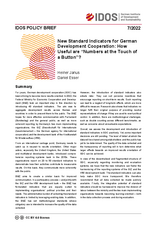Policy Brief
New standard indicators for German development cooperation: How useful are numbers “at the touch of a button”?
Janus, Heiner / Daniel EsserPolicy Brief (7/2022)
Bonn: German Institute of Development and Sustainability (IDOS)
DOI: https://doi.org/10.23661/ipb7.2022
Dt. Ausg. u.d.T.:
Neue Standardindikatoren für die deutsche Entwicklungszusammenarbeit: Was bringen "Zahlen auf Knopfdruck"?
(Policy Brief 3/2022)
For years, German development cooperation (GDC) has been striving to become more results-oriented. In 2022, the Federal Ministry for Economic Cooperation and Development (BMZ) took an important step in this direction by introducing 43 standard indicators. The aim was to aggregate development results across themes and countries in order to present them to the public. The BMZ hopes for more effective communication with Parliament (Bundestag) and the general public, as well as more coherent reporting by Germany’s two main implementing organisations, the GIZ (Gesellschaft für Internationale Zusammenarbeit – the German agency for international cooperation) and the development bank of the Kreditanstalt für Wiederaufbau (KfW). From an international vantage point, Germany needs to catch up in respect to results orientation. Other major actors, especially the United Kingdom, the United States and multilateral development banks, introduced compre-hensive reporting systems back in the 2010s. These organisations report on 20 to 50 standard indicators to demonstrate how their activities contribute to measurable results. On this basis, they communicate more coherently with the public.
BMZ aims to create a similar basis for improved communication. In a participatory process – and jointly with the GIZ and the KfW development bank – the BMZ has formulated indicators that are equally suited to implementing organisations’ political priorities and their needs. The administrative burden of collecting the standard indicators is limited by leveraging existing data. In addition, the BMZ has set methodological standards whose obligatory use is intended to increase the quality of the data collected. However, the introduction of standard indicators also entails risks: They can set perverse incentives that encourage reporting on short-term results. Such reporting can lead to a neglect of long-term effects, which are more difficult to measure. Research also shows that indicators no longer fulfil their original purpose of providing neutral representations of change if they are used to exert political control. In addition, there are methodological challenges, such as double counting across different benchmarks, as well as concerns about unrealisable expectations. Overall, we assess the development and introduction of standard indicators in GDC positively. Yet, some important decisions are still pending. The level of detail at which the data will be shared among stakeholders and the public has yet to be determined. The quality of the data collected and the transparency of reporting will in turn determine what larger effects towards an improved results orientation of GDC can be achieved. In view of the decentralised and fragmented structure of GDC, especially regarding monitoring and evaluation systems, we hope that the new indicators can foster the harmonising of the reporting systems of the GIZ and the KfW development bank. The standard indicators can also help make GDC more transparent. We therefore recommend that all data collected be made publicly available. Finally, the integrative potential of standard indicators should be harnessed to improve the division of labour between the ministry and the two main implementing organisations towards becoming learning-oriented – both in the data collection process and during evaluation.
Kontakt
Cornelia Hornschild
Koordinatorin Publikationen
E-Mail Cornelia.Hornschild@idos-research.de
Telefon +49 (0)228 94927-135
Fax +49 (0)228 94927-130
Alexandra Fante
Bibliothekarin/Open Access-Koordinatorin
E-Mail Alexandra.Fante@idos-research.de
Telefon +49 (0)228 94927-321
Fax +49 (0)228 94927-130





